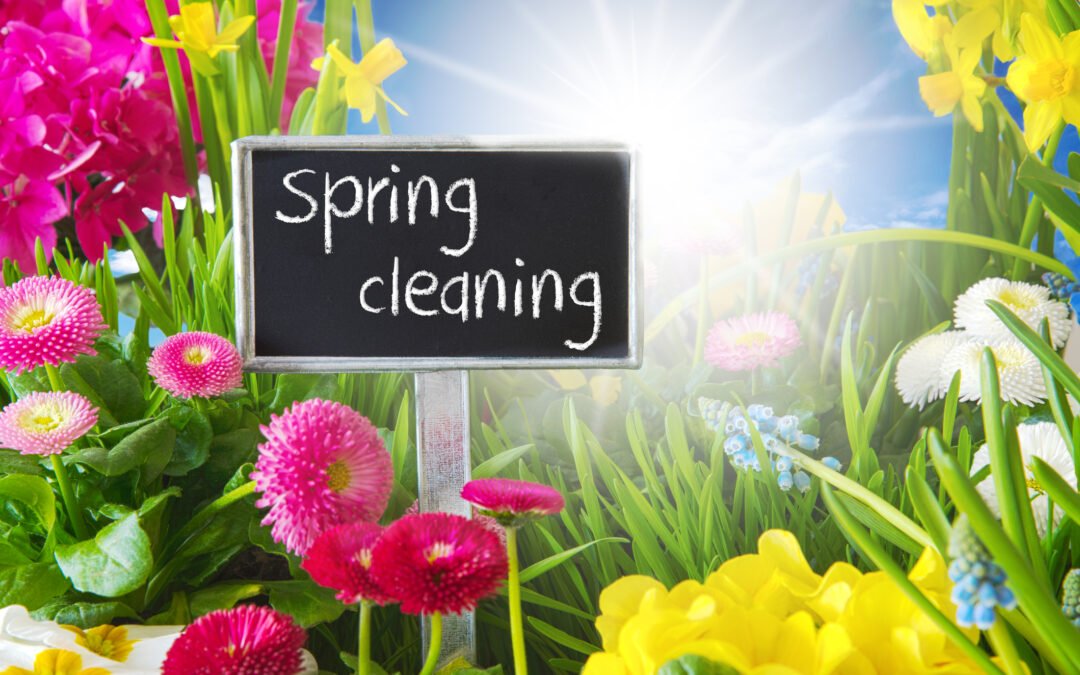Spring is a time for renewal and growth. The days are longer, and the temperature is warmer. Our emotions are lifted by extra light and the opportunity to invite more changes into our lives. This is the time of year when we feel energized and ready to improve our health and our physical surroundings. Many people begin their spring cleaning by eliminating clutter, opening windows, packing away winter clothes, and cleaning their home environment. Here are some suggestions for keeping your health a priority as you embark upon this year’s spring-cleaning routine.
Get plenty of fresh air daily.
Open windows in your home to increase the circulation of fresh air, even if it is for a short time during colder weather. High oxygen levels help increase the efficiency of many reactions in your body. Fresh air is a key component to losing weight, sleeping well at night, and preventing chronic diseases (most diseases cannot live in an oxygen-rich environment). Opening your windows, along with spending some time outdoors daily to increase overall exposure to fresh air, constitutes an important part of wellness.
Use houseplants to purify the air.
The average person spends 90 percent of time indoors, and air pollution inside homes or offices can be worse than outdoor pollution. The U.S. Environmental Protection Agency (EPA) ranks indoor air quality as one of the top five environmental risks to public health. If you are ready to grow fresh air, here are some tips:
- NASA studies recommend using one houseplant in an eight-inch diameter container for every 100 square feet of your home or office.
- Keep the top of the soil clean and free of debris since this is where much of the filtering happens.
- Keep the foliage clean and dust-free so the leaves can do their job. Wipe the leaves regularly, at least once a week.
- Three plant varieties to consider are the Areca Palm, Mother-in-Law’s Tongue, and the Money Plant. The Areca Palm removes carbon dioxide (C02) from the air and converts it to oxygen. The Mother-in-Law’s Tongue also does this, but during the night, which makes it an ideal bedroom plant. The Money Plant removes formaldehyde and other chemicals from indoor air.
Some studies show that indoor plants contribute substantially to microbiota abundance and diversity in the built environment, possibly preventing harmful bacteria from taking up residence. Other studies show improved productivity and mental wellness from workplace plants. These are all good reasons to consider adding some indoor plants to your home and work environment. Learn more about indoor air quality.
Use non-toxic household cleaners.
Improve the cleanliness of your home and reduce overall toxicity by making your household cleaners. Consider apple cider vinegar as a main ingredient since it has potent antimicrobial properties. Vinegar can disinfect and offer a safer, less toxic alternative. Dilute apple cider vinegar with water (1:1 ratio), and you have a natural cleaner. This can also be mixed with other natural cleaning products such as lemon juice, salt, or essential oils. Here are some household uses for the apple cider vinegar mixture:
- Wipe down your digital devices to disinfect them and create a nice shine.
- Remove ink stains from walls or floors (use full-strength vinegar).
- Remove mildew and water stains from your bath or shower.
- Sanitize clothes by adding a cup of vinegar to the load.
- De-grease your kitchen stove and countertops with the 1:1 solution.
Commercially available 3% hydrogen peroxide is also a stable and effective disinfectant when used on inanimate surfaces and is active against a wide range of microorganisms (bacteria, yeasts, fungi, viruses, and spores). Use 3% hydrogen peroxide in a spray bottle to disinfect bathrooms, toilets, counters, cutting boards, doorknobs, garbage cans, and refrigerators.
Get sunshine daily as part of your spring cleaning makeover.
Your vitamin D level also grows in the springtime. The Vitamin D Council recommends exposing your skin for half the time it takes for it to turn pink. Generally, 10 to 15 minutes of sunshine daily (without sunscreen) is sufficient. There is no additional Vitamin D benefit with extra exposure. In fact, ultraviolet light will begin to destroy vitamin D in the skin when the skin is overexposed.
Enjoy the beauty of this season and continue the journey to better health by adding fresh air, indoor plants, natural cleaners, and sunshine to your life.

